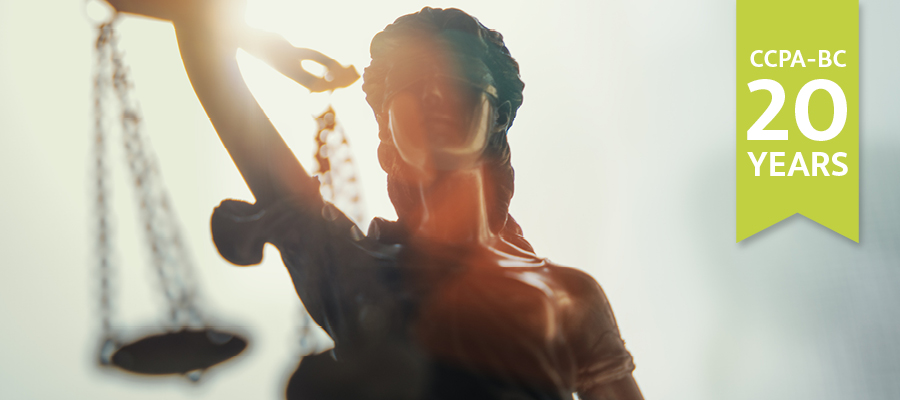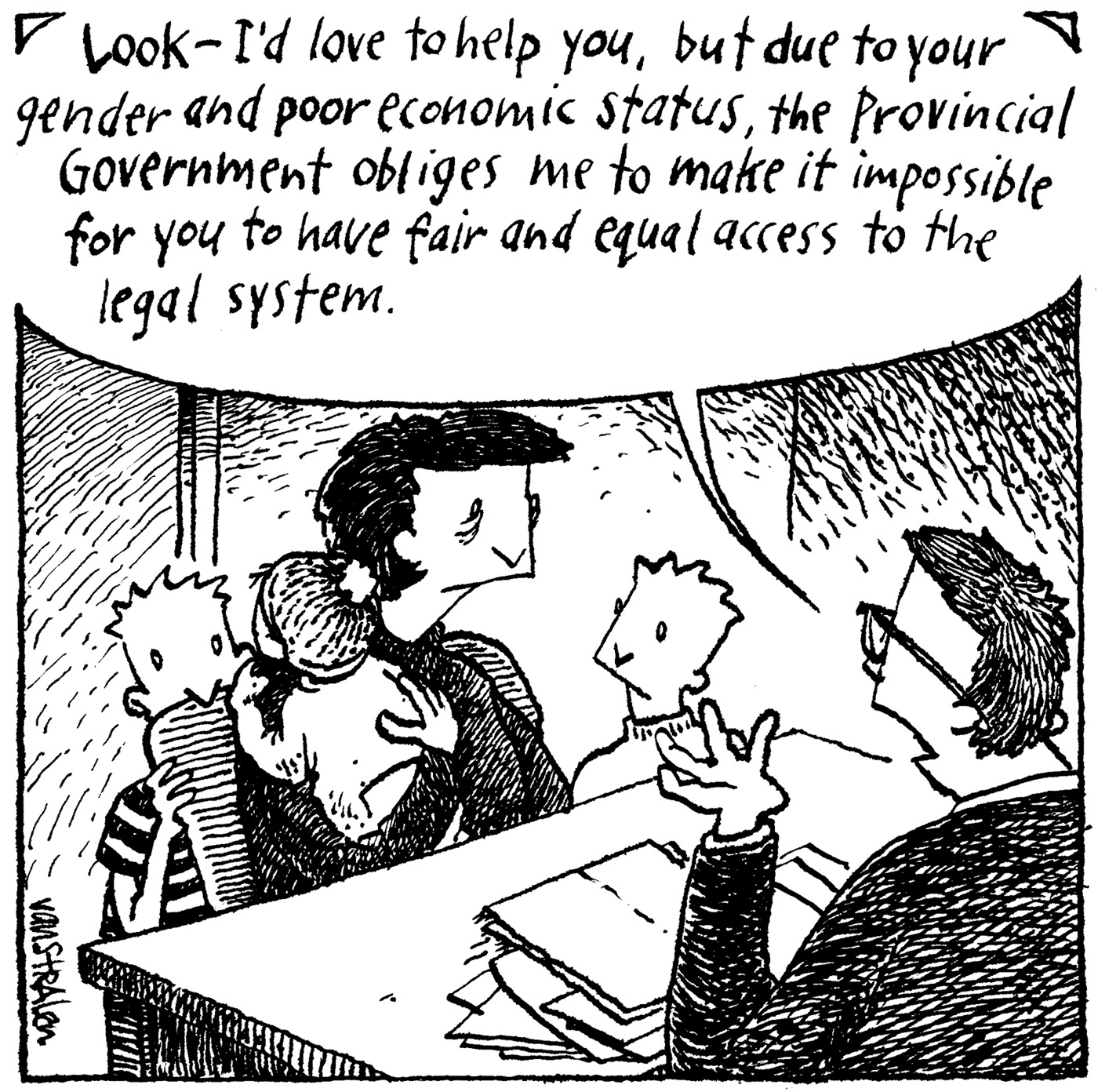Legal Aid Denied: A 20th Anniversary retrospective

Legal Aid Denied: Women and the Cuts to Legal Services in BC was written in 2004 shortly after the election of a neo-conservative Liberal government in BC. The report outlined the nature of the changes this government quickly introduced to the provision of Legal Aid in BC including slashing funding from almost $100 million to $60 million. The changes went beyond funding, however, as serious policy decisions and actions undermined women’s equality in BC. The report outlined those changes including:
- Fettering of the Legal Services Society’s (LSS) independence by changing the governance structure to a majority government-appointed Board of Directors;
- Directing the type of legal aid to be provided with government funds;
- Eliminating poverty law services;
- Shutting down courthouses around the province;
- Limiting family law to child apprehension cases and some high needs cases; and
- Creating a threshold for family law services where there was a “presence of family violence.”
These policies remain in place today except for the last one. The Legal Services Society provides legal aid in BC and the government continues to appoint the majority of seats on the LSS Board and continues to direct the kinds of legal aid services that LSS can support. The language in a Memorandum of Understanding (MOU) between the Attorney General and the LSS, and information on the LSS website, assert that it is independent of the government, but in fact it isn’t.
Women continue to bear the economic burden of childcare and divorce.
Legal Aid Denied outlined the connection between women’s equality and access to justice, including the important role family law plays in gender equality in BC. That connection remains true today as women continue to bear the economic burden of childcare and divorce. While BC was an early adopter of Equal Marriage, and therefore faced with the intersectionality of gender, queer family structures, childcare and family breakdown, it remains true that the poverty women and primary caregivers experience post-divorce can be partly addressed with a robust and functioning family law legal aid system.
Since Legal Aid Denied was published, some of the language in the MOU between the Province and LSS regarding the threshold for family law legal representation has changed. Financial eligibility for aid has risen: in 2004 a family of four was eligible if they earned less than $1,972 monthly and in 2017 it is $3,400. And eligibility is no longer conditional on the presence of violence. The province now requires a financially eligible individual to have a “significant issue” in their family law conflict including:
- Significant contested issues involving abuse;
- Pattern of one party “using the system to continue a pattern of abuse;”
- A risk of alienation of the children against one parent;
- The children are at risk if the conflict is not resolved; or
- Resolution of the conflict will have a positive impact on the parent/child relationship.
At face value, this threshold is difficult to argue against. The language reflects recommendations and points put forth by West Coast LEAF, BC’s Battered Women’s Support Services and other women-serving organizations. In fact, almost all situations that require legal representation in family law can fit this description, especially where there are children involved. Certainly those who have experienced conflict in family breakdown could probably identify with one or more on that list. Despite this, LSS provides very little aid for these criteria as demonstrated by the low funding provided to family lawyers for actual representation. LSS currently spends 1.1% of its budget on actual family law representation compared to 19% before the 2002 provincial government cuts. In addition, many who are financially eligible and meet other criteria may be denied simply because LSS has “run out of money.”1

In terms of funding, there has been no change. The government continues to underfund LSS given the revenue they collect for legal aid. In their 2015/16 Annual Report, LSS reports that the transfer from the BC government was $72.9 million, including federal funds. The report also states, however, that the federal government provided $14.7 million to the Province for legal aid services. Yet there is no explanation in the Annual Report or the audited statements that tracks how much of that almost $15 million was, in fact, transferred to LSS. There also continues to be no reference to how much revenue is collected by the Province through the special provincial sales tax (PST) on legal services—introduced by the NDP government in the nineties to cover Legal Aid costs in the province.2 The legal services PST is estimated to be $140 million.3 Therefore, the Province now collects substantial revenue it is not transferring to legal aid services. The statutory definition of ‘legal aid’ continues to be services provided by LSS.4 The argument has been made that access to justice is more than just the LSS budget, but given the statutory definition of legal aid and the language used when the PST was put in place, the government is spending legal aid funds on the legal system, not on legal aid.
The biggest transformation in access to justice in BC is the web of services that has emerged to fill the gap left by inadequate government funding, and the explosion of Public Legal Education and Information materials available. In terms of the latter, for example, the BC Courthouse Libraries developed an online portal for legal resources and assistance called Clicklaw and there are 378 family law resources available on this site including multiple websites claiming to assist anyone managing family law issues. Instead of collaboration, however, organizations like LSS, the Justice Education Society, Courthouse Libraries, the Supreme Court of BC and the Canadian Bar Association offer their own access points. Evaluations of the services and materials provided by each show that they do help some who access them, but there remain many people who need legal advice and representation that none of the plethora of websites offer.
The legal profession has always encouraged pro bono services—known outside the legal community as volunteering and providing free services—to those in need and in cases that have important legal implications. But the crisis in legal aid has resulted in huge pressure on individual lawyers, especially in small communities, to help people for free. The government, legal profession and the justice system all struggle to address the huge increase in self-represented litigants by developing services like three provincially funded Justice Access Centres in Nanaimo, Victoria and Vancouver, and family law duty counsel run by LSS.
There remain many people who need legal advice and representation that none of the plethora of websites offer.
West Coast LEAF continues to advocate for access to justice in family law post Legal Aid Denied and has published two reports, Rights-Based Legal Aid and Putting Justice Back on the Map. Rather than just argue for women’s equality, these reports explore legal aid delivery models that would work best for women. A common refrain from those with the power to implement effective legal aid (the legal profession, LSS, the provincial government) is to overstate the complexities of delivery models such as:
- tariffs to private practice lawyers create uncontrollable costs as the lawyer;
- the billing system is outside government control;
- clinics with staff lawyers are only accessible to some;
- conflict rules make it impossible for both parties in family law to access clinics;
- etc, etc, etc.
West Coast LEAF advocates for two delivery models that reflect its extensive research and the current reality that the community-based non-profit sector has actually picked up the access to justice slack. One model calls for having practicing family, immigration and poverty law lawyers as staff members in community-based organizations as has happened at Atira Women’s Resource Society and Battered Women’s Support Services. Both organizations hired lawyers in the role of legal advocate and worked with the Law Foundation to transform the two positions into full legal clinics with practicing lawyers able to represent each organization’s clients.
The second model recommended by West Coast LEAF is the family law clinic with a combination of staff lawyers and law students. In 2016, West Coast LEAF and UBC Law School launched Rise, a women’s family law clinic. Within three weeks, Rise had a three-month waiting list and continues to maintain a two-month waiting list.
Since 2004, a long list of studies, consultations and reports has been published by the legal community confirming the crisis in family law and other legal aid services. A new non-profit initiative called Access to Justice BC has brought together many key stakeholders and is focused on supporting innovation and integrated services, but like most BC legal community services it is under-resourced and has limited infrastructure.
Since 2004, a long list of studies, consultations and reports has been published by the legal community confirming the crisis in family law and other legal aid services.
In June 2017 British Columbians elected a new NDP minority government, replacing the Liberal Party for the first time in 16 years. In his mandate letter to newly appointed Attorney General David Eby, Premier John Horgan included this direction:
“Improve and support legal aid, including First Nations legal services, dispute resolution services for families and expanded poverty law services to increase access to justice.”5
This wording is worrisome for advocates of robust family law services as it seems to maintain the myth that government-supported family law services should focus on keeping family law matters out of court. In fact, the evidence is clear that keeping the right family law matters out of court actually demands family law representation. In addition, the push for mediation and other non-court dispute resolution processes may seem to save money, but this is not based on research, evidence or results. As reported in Rights-Based Legal Aid, where one or both parties are unrepresented, they are more than twice as likely to end up in court, costing the system, the individuals involved, and the long-term well-being of families and children.6
It remains to be seen if 16 years of underfunding, inconsistent collaboration and patchwork services will be turned around. Doing so is on the new government’s agenda, but that agenda item is, thus far, short on details about the future of legal aid in BC.
Notes
- B.C. legal aid suspends immigration and refugee services due to lack of funding. CBC News. June 29, 2017.
- Attorney General Moe Sihota, BC Legislative Assembly, Official Report of Debates (Hansard), April 3, 1992; and Geoff Plant, Opposition (later Attorney General overseeing 2002-2003 legal aid cuts), Hansard, May 11, 2000.
- There is no official reporting on this tax, but an anonymous law firm applied for documentation in 2104 under the FOI Act and released information estimating approximately $12 million per month collected. See Ian Mulgrew: Lawyers still rankled over legal services tax. Vancouver Sun. June 27, 2014.
- Legal Services Society Act, (s. 1).
- Honourable David Eby Attorney General: Mandate letter. Accessed Aug 28th 2017.
- Alison Brewin and Kasari Govender, Rights-based Legal Aid, (p. 19). CCPA-BC and West Coast LEAF. 2010.
Topics: Law & legal issues, Women


